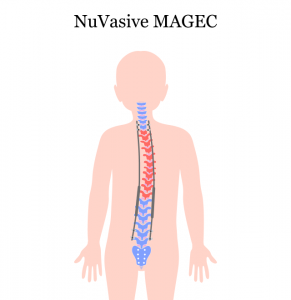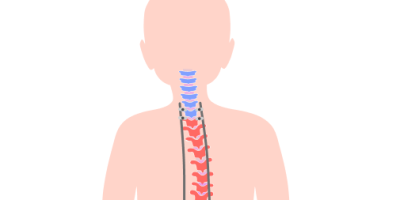NuVasive MAGEC System
The NuVasive MAGEC system is a spinal implant that helps straighten the spine in children with scoliosis. Complications of the MAGEC system include device failure, rod fracture and unplanned surgeries. NuVasive issued a recall in February 2020 because implanted device endcaps could separate.
Our content is developed and backed by respected legal, medical and scientific experts. More than 30 contributors, including product liability attorneys and board-certified physicians, have reviewed our website to ensure it’s medically sound and legally accurate.
legal help when you need it most.
Drugwatch has provided people injured by harmful drugs and devices with reliable answers and experienced legal help since 2009. Brought to you by The Wilson Firm LLP, we've pursued justice for more than 20,000 families and secured $324 million in settlements and verdicts against negligent manufacturers.
More than 30 contributors, including mass tort attorneys and board-certified doctors, have reviewed our website and added their unique perspectives to ensure you get the most updated and highest quality information.
Drugwatch.com is AACI-certified as a trusted medical content website and is produced by lawyers, a patient advocate and award-winning journalists whose affiliations include the American Bar Association and the American Medical Writers Association.
About Drugwatch.com
- 15+ Years of Advocacy
- $324 Million Recovered for Clients
- 20,000 Families Helped
- A+ BBB Rating
- 4.9 Stars from Google Reviews
Testimonials
I found Drugwatch to be very helpful with finding the right lawyers. We had the opportunity to share our story as well, so that more people can be aware of NEC. We are forever grateful for them.
- Last update: December 1, 2025
- Est. Read Time: 5 min read
What Is NuVasive’s MAGEC System?

The NuVasive MAGEC system helps straighten the spine in children with early onset scoliosis (EOS).
NuVasive’s MAGEC system is a medical device that treats children with early onset scoliosis (EOS). Children with EOS have a spine that grows in curves or twists instead of straight. EOS affects kids before age 10.
The FDA approved the system in 2017 for patients with progressive or severe EOS who have failed nonoperative treatment.
MAGEC stands for MAGnetic Expansion Control. The MAGEC system is made up of adjustable growing rods controlled by magnets and an external remote control. A surgeon implants the growing rods into a child’s back to help straighten the spine and enable it to stay straight as the child grows.
How MAGEC Treats Early Onset Scoliosis
Doctors have been using growing rods to treat EOS for several years. Surgeons implant two growing rods on either side of the spine. As children grow, the rods have to be lengthened every six months to facilitate spinal growth and straightening.
This process of lengthening and stretching the spine with implants is called distraction. Children implanted with traditional growing rods have to have distraction surgery every six months on average to adjust the rods as they grow.
With the MAGEC system, doctors implant special titanium growing rods into a child’s back once. This allows doctors to gradually stretch the spine by using a remote control and powerful magnets, without multiple invasive surgeries. This noninvasive distraction technique is an outpatient procedure that is typically quick and painless.
Potential Side Effects of the MAGEC System
As of November 30, 2024, the U.S. Food and Drug Administration’s (FDA) MAUDE Database shows 1,061 adverse event reports about NuVasive MAGEC devices since the device was introduced in 2017.
Since 2020, NuVasive has ordered recalls for its Model X MAGEC® System rod. Despite this, the FDA cleared a redesigned Model X rod in July 2020, which remains the only MAGEC device available in the U.S. This new design was supposed to mitigate endcap separation issues. However, in November 2022, NuVasive issued a recall of MAGEC 2 (marketed as MAGEC X) devices manufactured from April 2021 through October 2022.
- Implant Failure
- Implant failure occurs when the device loosens, fractures, corrodes or migrates in the body. Fractured rods may damage nearby tissues or structures.
- Mechanical Component Failure
- Rod endcaps — a metal piece at the end of the rod — may separate from the device actuator.
- Pain
- Pain may occur in the surrounding areas when implants fail. Pain may also occur when rods are adjusted.
- Distraction Failure
- The rods may not move as they are supposed to when being adjusted. This process is also called “distraction” in the medical community. They may also fail to stay in the proper setting between adjustments.
- Biocompatibility Concerns
- When the endcaps come off the rods, the body is exposed to internal components of the rods, which may or may not be compatible with the body and cause reactions.
- Metallosis
- Because MAGEC rods are made of titanium, they can release microscopic metal particles into surrounding tissues, causing metallosis, a condition caused by metal buildup in the body. These particles may cause tissue death and device loosening.
- Unplanned Revision Surgeries
- When health complications arise due to issues with this device, surgeons may have to perform revision surgeries to remove and replace MAGEC rods.
These issues have raised concerns about the safety and reliability of the MAGEC rod compared to traditional growth rods.
Serious Side Effects of NuVasive MAGEC Rod
Children with scoliosis often require surgery to lengthen their spine and fix its curve. Hospitals used the NuVasive MAGEC rods because growing rods can help reduce the number of surgeries in scoliosis patients, and these were thought to be more technologically advanced devices. However, a Spine Surgery and Related Research study conducted in 2019 revealed that many patients had issues with these rods and often needed unexpected revision surgery when the MAGEC rod’s distraction mechanism failed. These surgeries can be invasive and cause more problems, like increased pain and longer recovery times.
The researchers looked at databases that pointed to common issues with NuVasive MAGEC rods. Out of 163 issues reported, 129 were because the rods didn’t lengthen properly.
Other issues they found included broken rods and infections, but those issues happened less often.
Risk of MAGEC Complications
Children with early-onset scoliosis treated with magnetically controlled growing rods (MCGRs) — such as NuVasive’s MAGEC — face significant risks of complications, according to a 2024 study in The Journal of Clinical Medicine. Researchers found 66% of patients experienced complications, with 26% requiring additional surgical procedures to fix the problems caused by these medical devices.
Medical issues were common, affecting 45% of the children in the study. Children who are female, under age six, have more severe spinal curves (particularly over 90 degrees) or live with neuromuscular etiology were at higher risk.
Despite these challenges, the study’s authors found that the quality of life for these children and their families in general improved after MCGR treatment, especially when the number of overall surgeries for scoliosis was minimized.
NuVasive MAGEC Recalls
Due to safety and regulatory concerns, NuVasive’s MAGEC system has experienced at least two significant recalls and a temporary CE certification suspension.
These issues, ranging from packaging integrity to potential device failure, led to recalls and global shipment holds as the company worked to address risks and ensure patient safety. The defects in the recalled devices opened NuVasive to MAGEC lawsuits.
February 2020 Recall: Actuator End Cap Separation
In February 2020, NuVasive recalled the MAGEC System Model X rods because they found a problem where a part of the rod could come loose after it was put in. This could happen to about 0.5% of the rods.
This could expose some parts of the actuator, hastening the degradation of the actuator. In some instances, this exposure to the titanium caused discoloration of nearby tissue.
Even if the rods still worked effectively after this happened, NuVasive suggests that people who have them get regular check-ups with their doctor. They also recommended that doctors only take the rods out if this separation occurred.
April 2021: Temporary CE Certification Suspension
In April 2021, European regulators temporarily suspended NuVasive’s CE certification for MAGEC devices due to evidence gaps identified by regulatory authorities.
CE certification is a regulatory standard that verifies that a product is safe to use and sell in the European Economic Area. The suspension stopped MAGEC device sales in regions that require the CE Mark. At the same time, the company voluntarily halted shipments globally.
NuVasive assured regulators that it was working to address the certification issues. The company did not recommend removing functioning devices.
November 2022 Recall: Packaging Integrity Issue
In November 2022, NuVasive recalled some MAGEC 2 devices, also known as MAGEC X, because of a problem with how they were packaged.
The company found that 3.8% of the affected units had an issue that interfered with the packaging closure. This could have affected how sterile the devices were.
The company issued the recall to ensure that it was safe and that patients were not at risk. They mentioned that no infections or negative reactions have been reported because of this issue. The affected products were taken back, and doctors didn’t need to do anything extra to monitor the patients who had these devices, according to NuVasive.
FDA Warnings Affecting NuVasive MAGEC Devices
In 2021, the FDA issued a safety warning regarding NuVasive’s MAGEC spinal rod system, highlighting potential risks such as mechanical failures, including endcap separation and tissue reactions.
- MAGEC Spinal Bracing and Distraction System
- MAGEC 2 Spinal Bracing and Distraction System
- MAGEC System
- MAGEC System Model X device
- MAGEC System Model X rod
- MAGEC System Rods
These issues raised concerns about the biocompatibility of the device’s components, especially in children under 10, who rely on MAGEC to avoid multiple surgeries while treating scoliosis. Despite a recall and modifications, the FDA continues to monitor the situation to ensure patient safety.
Calling this number connects you with a Drugwatch.com representative. We will direct you to one of our trusted legal partners for a free case review.
Drugwatch.com's trusted legal partners support the organization's mission to keep people safe from dangerous drugs and medical devices. For more information, visit our partners page.




